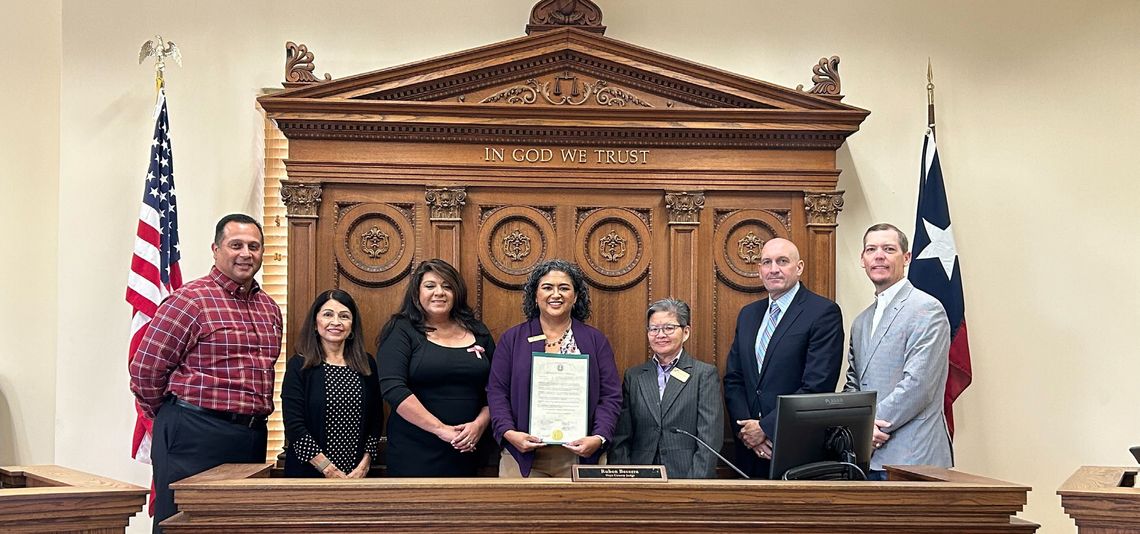HAYS COUNTY — More than one in three women, or 35.6%, and one in four men, or 28.5%, in the U.S. have experienced rape, physical violence and/or stalking by an intimate partner in their lifetime.
For the last 45 years, the Hays-Caldwell Women’s Center (HCWC) has offered free and confidential services to adults, youth and children in Hays and Caldwell counties who are victims of family violence, dating violence, sexual assault and child abuse.
HCWC provides emergency shelter and crisis response, legal advocacy that includes accompaniment to court hearings and appointments with law enforcement, a non-residential child-friendly facility where abused children can have a place to heal and the new Marla’s Place that offers a place for individuals to work toward getting a more permanent housing situation.
“Our name says women’s center, but I want to be very clear in that we are committed to serving any and every adult, youth and child who has an experience of abuse. We don't just serve women,” said chief executive officer Melissa Rodriguez. “Although in domestic violence, most victims are female, but not all and I also want the community to know that we are an inclusive environment.”
Identifying domestic violence
The majority of the time, people who are in an abusive relationship will not recognize it themselves, according to Rodriguez. And while people may typically associate domestic violence with physical injuries, she said that there are different types: physical, emotional/verbal, sexual and financial.
“It can be verbal, emotional abuse. And that's often how it starts, where it makes the person feel less worthy, can put them into depression, creating anxiety in the victim [and] can lead to withdrawal from their family members and their friends, their jobs, the things that they used to like and now they don't or they don't engage in,” Rodriguez said. “Domestic violence is very much rooted in power and control. And so, with that loss of control, it seems like you don't have any voice or choice in your relationship. [That] is a dynamic that should be addressed and it doesn't need to include any physical assault.”
It’s common for people in a committed relationship to not look at sexual violence as part of their dynamic, Rodriguez said.
“I think it's because people confuse the fact that if you've had consensual sexual contact, then you think like, somehow that entitles them to always have sexual contact. But that's not accurate,” she said. “Often, when someone is in an abusive relationship, sex is used as a method of control as well, and is pursued without the consent of the partner. And it is a form of sexual violence that can leave trauma.”
Financial abuse, while it is not talked about often, is a common experience where victims are controlled financially whether access to money is restricted or they don’t have access to their own accounts.
“They're watched every step of the way how they spend the money that they have access to. Financial abuse can also be putting your name [down] when you didn't want to have credit in your name, or being forced into going into some financial contracts,” Rodriguez explained. “That's not exactly what the victim would want, which can leave them feeling like they don't have a choice but to stay in the relationship, because it can affect them negatively.”
When to know it’s time to get help
Those who may be questioning or are not sure if they are in a violent relationship are encouraged to call the HCWC HELPline at (512) 396-HELP (4357).
“Anyone can call and just have a conversation with one of our advocates. It's not uncommon for people to call questioning, it's usually the way it happens when people will say, ‘So my friend told me I should call you because they think that I might not be in a safe relationship,’” Rodriguez said. “And it's like, ‘Okay, well tell me more about that.’ It's not until they start unpacking their experiences that they realize, like ‘Oh, this is unhealthy’ or ‘This is abusive.’ Relationships are on a spectrum and so that's what makes it so complicated. There's no right or wrong, black or white.”
Rodriguez said it’s crucial that people seek supporting guidance from someone who is a neutral third-party because sometimes, friends or family members “might have different thoughts and experiences or opinions about your partner.” But it’s always helpful to seek outside, professional support, whatever that looks like for that individual.
“If [they] call us, we're not going to force one way or the other what [they] do with the information, we're just here to educate and support them. And it's up to them to make the decision whether they want to seek additional services or support through that process. So, they can call many times,” she said. “They can show up [and] decide ‘I'm not ready’ ... There's no timeline. The support is very individual and it's up to that person when they're ready to seek that out.”
If you or someone you know needs to talk to someone about a relationship they are in, call HCWC’s HelpLINE at (512) 396-HELP (4357). For more information about the resources that the center offers, visit www.hcwc.org.
Hays-Caldwell Women's Center helps domestic violence victims have a voice
HAYS COUNTY —
- 10/18/2023 08:20 PM










